- Home
- Brian Spangler
End of Gray Skies: An Apocalyptic Thriller
End of Gray Skies: An Apocalyptic Thriller Read online
CONTENTS
Title
Copyright
Dedication
Acknowledgements
Also By
Subscribe to my Newsletter
End of Gray Skies
Gray Skies
Chapter 1
Chapter 2
Chapter 3
Chapter 4
Chapter 5
Chapter 6
Chapter 7
Chapter 8
Blinded By Sight
Chapter 9
Chapter 10
Chapter 11
Chapter 12
Chapter 13
Chapter 14
Chapter 15
Chapter 16
Chapter 17
Chapter 18
Chapter 19
Chapter 20
Union
Chapter 21
Chapter 22
Chapter 23
Chapter 24
Chapter 25
Chapter 26
Chapter 27
Chapter 28
Chapter 29
Chapter 30
Chapter 31
Chapter 32
Chapter 33
Chapter 34
Chapter 35
Chapter 36
Chapter 37
Chapter 38
Chapter 39
Chapter 40
Chapter 41
Epilogue
Thank You
About Me
Excerpt from Killing Katie
End of Gray Skies
Gray Book Two
BRIAN SPANGLER
End of Gray Skies
Gray Book Two
Copyright © 2014-2016 by Brian Spangler
writtenbybrian.com
This is a work of fiction. Names, characters, organizations, places, events, and incidents are either products of the author’s imagination or are used fictitiously. Any resemblance to actual persons, living or dead, or actual events is purely coincidental.
No part of this work may be reproduced, or stored in a retrieval system, or transmitted in any form or by any means, electronic, mechanical, photocopying, recording, or otherwise, without written permission of the publisher.
DEDICATION
To my friends and family for their love, support and patience.
ACKNOWLEDGEMENTS
While working on this short story, I was aided by several individuals to whom I wish to offer my immense gratitude and appreciation. Thank you for reading many drafts of this story, and for offering critiques and encouragement. As always, your feedback has helped to shape the story.
To David Gatewood, Don Shope, Kay Bratt, Lisa Akers and Krista Slavin for providing invaluable feedback, and helping me recognize the potential of the story.
End of Gray Skies
GRAY BOOK TWO
Gray Skies
1
JAMES SUNDREF PEERED UP at the executive guards and nodded. Their faces remained unchanged, void of expression. How many times since his promotion to four bands had he offered this simple gesture? How many times had he been ignored? After all, he was an executive, and that should command a certain level of respect, shouldn’t it? James shrugged his meaty shoulders and supposed the guards just didn’t care who he was.
He gave a glum look to the balcony’s ledge and a feeling of calm washed over him. In a moment, his final career advancement would take him to the top of the ledge—where he’d leap to his death. He imagined himself perched atop it, his round frame trying to balance itself in the moment before jumping. Just how far down is it to the courtyard? He quickly dismissed the question, knowing that it didn’t matter, that he had to go through with it. There were no more options.
James paused, thinking of all the lives he’d affected in the Commune, the largest community in the region. How many? he wondered. All of them? The number he saw in his head was daunting, and the guilt pressed down on him. Before he could take another step, he heard the curious turn of the guard’s head. James immediately realized what he’d done. Standing in front of the executive entrances was not permitted. Well aware of the rule he’d just broken, he pulled in a resigned breath and moved on. James knew all the rules. He knew them because he’d written most of them, just as he had written his final Commune rule earlier that morning.
“What does it matter now, anyway?” he mumbled. “I’m a dead man.” He tugged at the collar of his coveralls, trying to make room for the fatty folds around his neck. Choking back his breath, he shivered against the coolness of a light sweat on his skin. He shook again, knowing death was waiting for him.
When he reached the ledge, he realized for the first time just how high the executive floors were. His stomach immediately went to his throat, and he heaved in a breath that shuddered with fear. For a moment, his insides flipped, and he tried to commit his mind to the jump that would end his life.
Yet, maybe there were options. Maybe he could exile himself? But the idea of fending for himself outside the safety of the Commune made him laugh. He chuckled as he imagined a fat man running in the fog while Outsiders chased him down. Leaping from the executive floor was an easier death. It was quick and painless… he hoped.
Janice Gilly’s face came into his mind, and his laugh abruptly ended. His smile turned down into a frown as he considered how he’d broken their bond. Choosing was forever, and while she’d chosen him, James had decided to become an executive instead. Even after their time to have a child had expired, she’d wanted to continue their lives together. He could have stayed with her. He should have stayed with her. But his work—his mistress—had called to him, lied to him, told him half-truths about the good he would do in the name of the Commune. Without a child to raise, leaving Janice was just the easier thing to do. But easier for whom?
Regret followed and he shut his eyes, welcoming the darkness. He considered how there was more to blindness than just the absence of sight. He’d been blind to what he’d had with Janice, blind to the outcome of his ill-fated decision. It was just a promotion. He could see that now, but it was too late. It had been too late for a very long time. James wondered if maybe she’d forgotten about him? He hoped that she had, and that the pain he’d caused was just a mere thought, a fleeting memory.
He could see the faces of those who had died as a result of his actions. But, of course, someone in his position knew they weren’t just dead. It wasn’t that simple. He’d come to learn that small fact, and had wished he’d known less. There were secrets behind the doors of the executive offices, and he’d had his fill of them for one lifetime.
James gripped the ledge, his soft pudgy fingers scraping against the coarse resin that was meant to protect. He looked briefly at the dimpling in his palms before taking hold again. It never had to be like this. He winced, and then tried to lift himself up onto the small divide that separated life from death. At once he felt himself begin to struggle. Blood rushed into his face, and sharp lights streaked across his eyes. He coughed a flood of air from his lungs, gasping, and finally dropped back to his feet. Turning away from the ledge, he began to cry. How pathetic had he become? He couldn’t even lift himself.
From the corner of his eye, he saw that he’d roused the attention of one of the executive guards. Lifting his hand, he swiped at the sweat rolling from atop his head, and waved.
“Indigestion, is all,” he explained. “I’ll be fine in a minute.”
The guard stared a moment, motionless, before turning back to stand at attention. James forced himself up and around and leaned over the ledge. The courtyard far below him was nearly empty. A few children ran around, playing chase with one another, their paren
ts gathered into small circles, trading stories or gossiping. He enjoyed watching the children run freely in the courtyard. The child-tethering rule he’d authored that morning wouldn’t have been enforced yet. The children were free today, but in a week that would change.
A lot of things were going to change. More than one new rule was being passed, and his hands were on all of them.
A quick death would anger the upper executive levels once they’d found out what he’d done. James let out a deep, gratifying sigh and smiled. They would have wanted him exiled from the Commune. The weaponized flu they’d given him to use would be too merciful, too quick. They would want him to suffer at the hands of the Outsiders, or starve on the black sands of the beaches, eating salt-gnats and drinking seawater until his insides burst.
An earthy scent came to him in a pleasurable whiff. He’d always loved the smell of plant life rising from the farming floor. Yet today, the farms struck a grim note. With the redolence came images of his being alone during his cleaning and passing. An unsettling notion came next: that nobody would be with him as he was passed to the farming floor. He thought of Sandra Chambers and her daughter Hadley, and the executives that had attended their cleaning and passing. He was supposed to have gone, too. He’d tried to go. Biting his lower lip, he thought of how he’d stood just out of view, just far enough to still hear the boy, Declan, grieving for his mother and sister. He’d stayed and listened until the completion of the rite and then the passing of their bodies. He’d stayed, but was never seen.
Sandra Chambers knew, too. She’d known what the upper-level executives were doing. Now it wouldn’t be long before everyone knew. She wasn’t supposed to know, James reminded himself. She was just a junior executive. Innocent. She would have never known what was really going on if it weren’t for his carelessness. Her finding out was his fault. A rush of guilt hit him, knotting his gut as he leaned into the balcony ledge, overwhelmed.
It was just supposed to make her sick. I used the exact amount. Shaking his head, he regretted his naivety and the storm of lies he’d been so willing to trust. Why did I listen to them? He leaned harder against the ledge, feeling it pressing into his middle, threatening to take his breath. She was only supposed to get sick: sick enough to miss the meeting and the vote. The damn vote. And why was her daughter with her? James felt a cramp in his heart, and for a moment he was certain he was going to keel over before he got the chance to jump. He imagined dying on the balcony, his heart exploded in his chest. His thoughts returned to Sandra’s daughter, Hadley: another innocent victim in the mess he’d created, a bystander who drank from the same cup as her mother. Sandra’s death and the death of her daughter were both his to bear, and the guilt was his to die with. And maybe that’s what fueled the guilt faster, hotter. Death would douse those flames.
As he stood there, paralyzed with guilt, his gut spilling over the ledge, he spotted activity below. A balding man stumbled through the collection of children playing in the courtyard. The man shuffled his feet past the huddled parents, waving once, then falling. Recognition struck James, and it nearly brought him to his knees: the man was Richard Chambers, Sandra’s husband, the father of Hadley and Declan. Executive guards were already approaching Richard, eager to remove the intoxicated sight from the Commune’s courtyard.
I did that to him, James thought. I broke that man.
James shook off a tear as an unnatural calm came over him. He huffed out the air in his lungs. He was ready. From his front coverall pocket, he pulled a small index card and turned it over so that the rows of numbers were facing him. He pushed his finger across the imprint of inky black and squared glyphs, studying them.
“This is what started it all!” he shouted, and snapped his head over to the executive office entrance and the guards standing there. They turned in the direction of his voice while he ripped the index card in half. The sound and feel of the shredding rushed through him like a climactic release. Ending what he’d started, and knowing his time was coming, James tore into each new half, eager to finish. He tore the halves again and again before throwing the pieces from the balcony. The executive guards were approaching him now, uncertainty and confusion replacing their normally blank expressions.
It was time.
The muscles in his arms quivered under the strain of his weight, and then began to shake wildly as he desperately pushed himself onto the ledge. He was crying, and a mix of running sweat and tears needled his eyes, but it wasn’t due to the thought of what he was about to do; it was because of the misery he’d caused Sandra’s family, and for the regret he felt at losing the love of his life. He’d broken his bond with Janice Gilly, and for what? Who had he become in the years since he’d been with her? What was his contribution? Rules? Janice had contributed. As a teacher, she’d influenced and mentored her students. And maybe subconsciously it was to compensate for the lack of having children, yet even so her work was admirable: righteous and pure. He’d instead spent his time learning things he didn’t want to know, and writing rules to uphold them.
As he got feet under him and began to stand, he was no longer crying—he was laughing. And as he stood atop the ledge, balancing with his arms outstretched, he heard the rapid pummeling of feet hitting the balcony floor, and the hollering of the guard’s voices as they shouted at him to get down. After all, standing on the balcony ledge was against Commune rules. He’d written that rule too.
His stomach leaped back into his throat as he peered over his belly to the courtyard below him. The pace of the executive guards quickened, and their words became more urgent, yet he heard only mumbles and the beat of his heart. The beating in his chest wasn’t the rapid thumping of fear; instead, it was both rhythmic and calming. It was satisfying.
Though his eyes had aged, and his sight was at times blurred, James could see the remains of the index card lying on the courtyard below. A few of the children picked up the pieces, taking them to their parents, surely with wonderment, with questions about the strange material and the printed numbers.
James leaned into the last step of his life. He said little, mumbling aloud a dribble of loosely connected words, confessing what he’d done to Sandra and her daughter and to the Commune. And as he confessed, his mind emptied, and his body fell through empty space. A lot of time seemed to pass before he reached the courtyard. He kept his thoughts to a minimum, limiting his mental imagery to only Janice’s beautiful face, and to the imagined faces of the children they’d never had. Once or twice, he mouthed the words, “I love you, Janice,” and before the dense and unforgiving concrete floor finally met him and took his life, he had one final thought, one that he regretted having:
What if they bring me back?
2
ONLY FOUR WORDS WERE scrawled on the otherwise-empty blackboard this morning: End of Gray Skies. Under the words, a seldom-seen thinning swirl of chalk dust clung to the blackboard’s surface, emphasizing what day it was. As Declan Chambers took to the seventh row to find his seat, he heard the first of many whispers. A buzz of excitement was beginning, and he felt an anxious tingle inside. As much as he tried to dismiss the day and push it away, for fear of disappointment, he couldn’t help but let himself feel some of what was spreading throughout the class.
Looking from face to face, he scanned the classroom, and saw smiles adjoining cupped hands over attentive ears. Gleeful whispers grew into a fevered chatter of children’s voices—some young, some old. All were anticipating the announcement; even Ms. Gilly seemed to sit a little taller in her aging chair. Her hands were clasped together and resting on her desk, with fingers interlaced so tightly that her knuckles turned white. And unlike most days, her hair was fixed high in a bonnet of heavy dark curls, making her look younger than she was. While the classroom filled, hints of a smile crept up the corners of her round cheeks, and her face flushed as if she, too, held back her own elation.
For some of the younger children in the class, this would be their first time hearing the announcement.
For Declan, it would be his third time. But, at seventeen years of age, he didn’t remember the first End of Gray Skies announcement. He remembered the second one—as well as the disappointment that had followed. That somber moment of failure had crippled his Commune. The disappointment from the failed End of Gray Skies had no boundaries. He’d heard stories of other Communes and their descents into lowly times; he’d even heard about depression and mass suicide. Like the centuries-old fog hugging their world, those memories were dim, lacking detail. By today’s end though, surely new memories would erase what hadn’t happened five years earlier.
Maybe… maybe this time, the End of Gray Skies will be the last announcement. Declan blinked, and enjoyed the wishful thought.
Sounds of chairs being dragged from underneath their accompanying desks drowned the growing chatter. Clunky scrapes of metal against the wood floor followed as the class settled into their morning routine. Declan had spent ten years in the same room, and only now did he notice the wear of the chairs on the floorboards. This room was their only classroom for every grade, from six years of age to eighteen. For hundreds of years, generation after generation of students had sat in these chairs, had read from the same blackboard.
Reaching back as far as the stretch of a child’s arm, the feet of the chair legs had carved thin paths into the wood floor. The planed tracks glinted soft reflections from the skylights above. Declan wondered who the children were who had walked these same floors, sat in these same chairs, and took notes from the same blackboard for generations before him.
Could they have been the ones: the ones who had caused the accident? Were they responsible? He shrugged the thought away, dismissing what couldn’t be changed.
With his own seat under him, he pulled from his desk the remains of his monthly parchment allowance. He brushed his hand over the wrinkles and played with the fraying, pulpy fabric at the corners. He pushed his thumb over the black smudges that had stained deep into the weave of threaded fibers, and he knew that a cleaning would be one of this evening’s chores. How many cleanings was that?

 Affair with Murder The Complete Box Set
Affair with Murder The Complete Box Set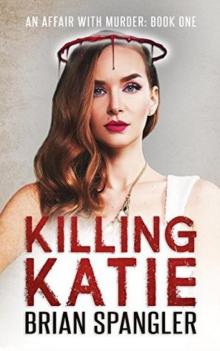 Killing Katie
Killing Katie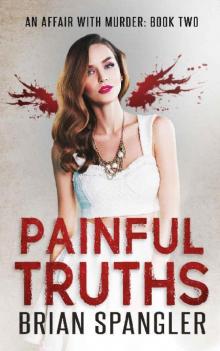 Painful Truths
Painful Truths Grave Mistakes_A Deadly Vigilante Crime Thriller
Grave Mistakes_A Deadly Vigilante Crime Thriller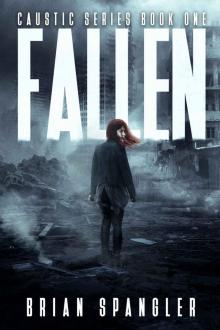 Fallen: Post-Apocalyptic Dystopian Thriller - Book 1 (Caustic)
Fallen: Post-Apocalyptic Dystopian Thriller - Book 1 (Caustic)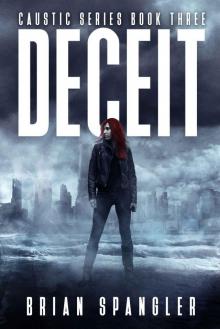 Deceit: Post-Apocalyptic Dystopian Thriller - Book 3 (Caustic)
Deceit: Post-Apocalyptic Dystopian Thriller - Book 3 (Caustic)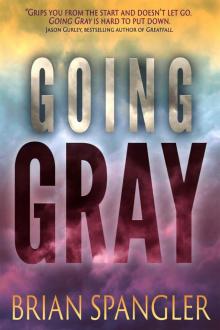 Going Gray
Going Gray Union
Union Grave Mistakes: A Deadly Vigilante Crime Thriller (Affair with Murder Book 3)
Grave Mistakes: A Deadly Vigilante Crime Thriller (Affair with Murder Book 3) End of Gray Skies: An Apocalyptic Thriller
End of Gray Skies: An Apocalyptic Thriller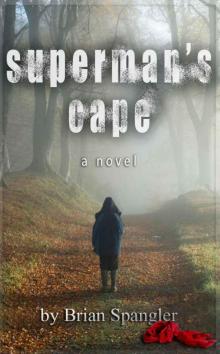 Superman's Cape
Superman's Cape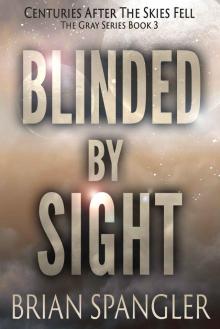 Blinded By Sight (Gray Series Book 3)
Blinded By Sight (Gray Series Book 3)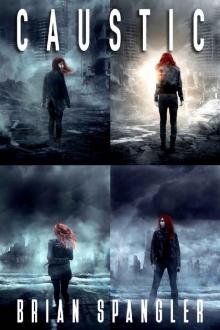 The Complete Four-Book Box Set
The Complete Four-Book Box Set Endure: Post-Apocalyptic Dystopian Thriller - Book 2 (Caustic)
Endure: Post-Apocalyptic Dystopian Thriller - Book 2 (Caustic)